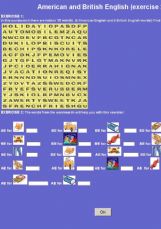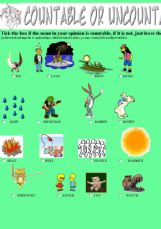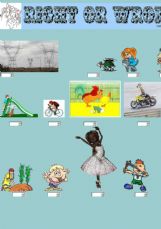
MUST - MUSTN�T / HAVE TO - DON�T HAVE TO
Easy tasks to see the differences between "must and have to". 1) the sts choose must or mustn�t. 2) They choose have to or don�t have to. 3) They fill in the blanks with must-mustn�t-have to-don�t have to. 4) They make sentences by using the words given. Hope you like it. Have a nice day :)
Level: elementary
Age: 8-14
Type: worksheet

Means of Transport Crossword Puzzle for Elementary or Lower Intermediate students
This is the crossword puzzle I�ve made to use with the flashcards on the same topic http://www.eslprinta bles.com/printable.a sp?id=258586#thetop but you can use it by itself. Students do the crossword puzzle and match the images to the description. Tomorrow I�ll try to upload an easier vocabulary exercise for younger students. Wish you a nice Sun...
Level: elementary
Age: 8-12
Type: worksheet

Grammar Quiz series (8) - Will or Be Going To Future?
This is the 8th quiz of this grammar series - Grammar Quiz + B&W Version + KEY, in which the students have to solve a multiple choice exercise, choosing the right verb tense according to the context. Wish you all a wonderful Week! Thanks for your lovely comments on my work. Hugs, mena :)))
Level: intermediate
Age: 12-17
Type: worksheet

Countable or Uncountable? I (1/2)
It�s a worksheet for students to practice the use of countable and uncountable nouns. There�s a short grammar explanation, some examples and activities to practice. I hope you find it useful!
Level: intermediate
Age: 10-17
Type: worksheet

tracing worksheet - family members
Level: elementary
Age: 4-5
Type:

GOING TO or WILL??? (Re-uploaded)
A worksheet for the students to practice future tense (WILL or GOING TO). They fill in the blanks using the correct future form of the verbs and the match the sentences with the related picture.KEY is included.I deleted yesterday�s worksheet because of my being absentminded :) and re-uploaded this one.I hope you don�t mind it. Thanks for all your k...
Level: elementary
Age: 10-14
Type: worksheet

"My Country" - (6th in the series) - 2nd 45-minute-lesson for Upper Elementary or Lower Intermediate Students
This is no. 6 of the reading/writing series. It can be used separately or as a second lesson after the reading comprehension on one of the worksheets I�ve uploaded last week on countries and nationalities. This time students complete a paragraph describing a country (The USA) according to the information given in the fact file. Then they complete ...
Level: elementary
Age: 10-12
Type: worksheet

MUST - MUSTN�T - 1 - TRAFFIC RULES POSTER (editable)
A new poster about must - mustn�t. Have a nice day!
Level: elementary
Age: 10-17
Type: Choose

Past Simple or Past Continuous? - Grammar Quiz series (5)
This is the 5th quiz of a new grammar series - Grammar Quiz + B&W Version + KEY, in which the students have to solve a multiple choice exercise, choosing the right verb tense according to the context. Wish you all a wonderful week! Thanks for your lovely comments on my work. Hugs, mena :)))
Level: elementary
Age: 9-12
Type: worksheet

ADJECTIVES IN -ED OR -ING (1-2) B&W VERSION+KEY INCLUDED
This is the first worksheet in a set of two on adjectives in -ed and -ing.Students complete the sentences with -ing or -ed adjectives, which they will have to form adding these suffixes to the verbs next to the pictures. THE KEY IS INLCUDED. I hope you like it and find it useful. Have a nice Wednesday. Hugs!
Level: elementary
Age: 12-14
Type: worksheet

British English vs American English
A worksheet I�ve created to work on the most commonly used words that are different between US Am English and Brit English. It is noce and not so difficult. I hope you�ll like it!
Level: intermediate
Age: 12-17
Type: worksheet

A-AN-THE or ZERO ARTICLE
Practice on the articles. 1) They read little text about people and fill in the blanks. 2) They put suitable articles or zero article. 3) They read a text about London and fill in the blanks with a-an-the oe zero article. Hope to be useful!
Level: elementary
Age: 10-17
Type: worksheet

**TOO or ENOUGH** (B&W+KEY included)
Through this ws sts see the usage of "too - enough". A short explanation, 5 different exercises to practice: 1) They choose the correct answer. 2) They do the matching. 3)They fill in the blanks. 4) Complete the dialogue with the proper words. 5) Finally they rewrite sentences with "too or enough". I hope you like it and it helps you save your time...
Level: elementary
Age: 10-14
Type: worksheet

PRESENT SIMPLE OR CONTINUOUS- MULTIPLE CHOICE (B&W VERSION INCLUDED)
Students choose the right alternative out of four to complete the blank spaces in the sentences. I hope you like it and find it useful. Have a wonderful week. Hugs!
Level: elementary
Age: 10-12
Type: worksheet

Simple Past or Past Continuous? - Inductive Approach
A 2-page worksheet in which students are led to infer some rules of use and form followed by 4 different exercises. Students read some sentences and complete the tables with the Simple Past and the Past Continuous(affirmati ve, negative and interrogative forms). After remembering some spelling rules as well as the use of both tenses, they do some ...
Level: elementary
Age: 11-12
Type: worksheet
|

To infinitive or ing form
A nice ppt about to infinitive or ing forms after certain verbs and their changes in meaning. Hope you find it useful!!! By Pacchy
Level: advanced
Age: 14-17
Format: PowerPoint

Pass the word - American vs British English *GAME* (6/6)
The last part of a ppt game on American vs British English. Hope you can use it with your students. Have a nice day, mada :)
Level: elementary
Age: 12-17
Format: PowerPoint

Trick or Treat Game 2of2
Knock-knock! Trick or Treat. Who are you?
Use to drill lessons about halloween vocabulary. Due to the file�s size,it is sent as two parts. Moreover, this file could also be edited. You can add more slides by duplicating each slide and changing the pictures according to your halloween words.
Level: elementary
Age: 6-12
Format: PowerPoint

Make opposites - Prefixes Game part 3
And, finally the third part.
Have a nice day!
Level: elementary
Age: 8-14
Format: PowerPoint

American vs British English - vocabulary with sound (2/2)
Part 2 of appt presentation to teach and practise American and British English vocabulary differences. Enjoy, mada :)
Level: elementary
Age: 12-100
Format: PowerPoint

AS or LIKE
These similar words "as" & "like" often give students problems. Hope these 30 slides can help.
Level: intermediate
Age: 13-17
Format: PowerPoint

Make opposities Prefixes Game - part 2
This is the second part of a game on prefixes.
For a description, please see part 1.
Level: elementary
Age: 8-14
Format: PowerPoint

A or an with garfield
a fun, colorful ppt to learn a or an. Children love this Garfield PPT to learn a or an.
Level: elementary
Age: 6-12
Format: PowerPoint

little / a little / few / a few
A very clear explanation of the use of "(a)little and (a)few", with examples and exercises.
Level: elementary
Age: 7-17
Format: PowerPoint

Fun activities for your last five or ten minutes of class
These are some short fun activities to do with your students as warmers, fillers,ice breakers, etc.
Level: elementary
Age: 10-17
Format: PowerPoint

Gerund or infinitive?
The verbs hate, love, like, prefer are usually followed by a gerund when the meaning is general, and by a to-infinitive when they refer to a particular time or situation. You must always use the to-infinitive with the expressions �would love to�, �would hate to�, etc.
This is a worksheet, you can find grammar and exercises. I hope you like it!
Level: elementary
Age: 11-17
Format: PowerPoint

British and American English Quiz
This is a fun quiz to test students� knowledge of the differences between American English and British English, particularly the vocabulary and basic spelling differences. This quiz is designed to go with my American/ British English presentation and it covers the same vocab and spelling as was covered in that presentation.
Hope it�s useful!
Level: elementary
Age: 9-17
Format: PowerPoint

ACTIVE OR PASSIVE - present continuous
Students have to decide if the sentences are in the active or passive form. All the sentences are in the present continuous. Worksheet uploaded on the same subject. Jannabanna.
Level: intermediate
Age: 13-17
Format: PowerPoint

British/American English
PP dealing with British and American English. It describes history, pronunciation, grammar, spelling, vocabulary, etc. differences. Updated and improved version.
Level: intermediate
Age: 9-17
Format: PowerPoint

How many or How much?
An activity in which students practise the structures "how many are there?" and "how much is there?" to ask about food and objects. After they make the questions, answers appear in the following slides.
Level: elementary
Age: 8-17
Format: PowerPoint
|

THIS OR THAT
WRITE THIS OR THAT
Level: elementary
Age: 6-14

Jungle animals... or are they?
Find all the jungle animals in the string of words and write them down. Spot the odd ones. Then find the jungle animals in the word scramble.
Level: elementary
Age: 6-8

been or gone
it is to practice been/gone
Level: elementary
Age: 10-100

Preparation for the Exams or Tests (A MOCK FCE)
This material is created to provide ss practice necessary in their exams. SS can develop necessary skills and learn to undertand grammar. Subjects covered: Verb tenses, mostly Past, Prepositions (dependant), Gerunds and Infinitive (bare infinitive inter alia).
Level: advanced
Age: 10-100

PRESENT TENSE - Questions "DO" or "DOES"
The students have to write the questions - starting either with do or does - into the gaps!
Level: Choose
Age: 11-100

SOME or ANY exercise
Fill in exercise for elementary students. This exercise will help students to recoqnise the use of determiners: SOME and ANY.
Level: elementary
Age: 9-11

Some or any
First you revise when do we use some or any then try the exercise
Level: elementary
Age: 11-100

American English - British English (exercise 2)
Another exercise concerning AE(American English) and BE (British English)
Level: elementary
Age: 8-14

I or Me
To let the children know how to use I or me properly.
Level: elementary
Age: 6-8

Must/mustn�t ,can/can�t or may.
Students will be tested on the use of modals:MustMustn�t ,can/can�t or may.
Level: elementary
Age: 6-14

Past Tense or Past Perfect tense
Grammar exercise: Revise: Past Tense or Past Perfect Tense
Level: elementary
Age: 12-100

Countable or Uncountable?
Students have to decive whether the noun is or is not countable.
Level: elementary
Age: 5-100

THIS-THAT or THESE-THOSE
It will help you to practise the demonstratives a lot!!
Level: elementary
Age: 10-100

To tattoo... or not to tattoo?
Reading task about tattoos with true and false activities
there is also a wordsearch to revise the vocabulary from the reading
Level: intermediate
Age: 14-14

Right or Wrong
For young learners
Level: elementary
Age: 3-6
|